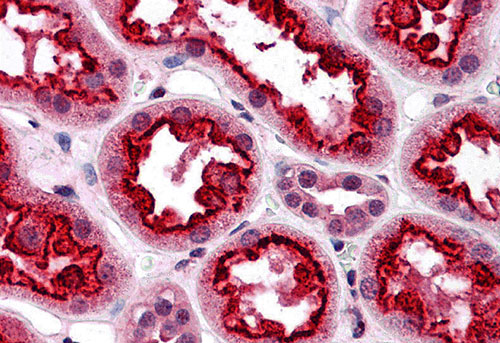TAB3 Antibody
- SPECIFICATION
- CITATIONS
- PROTOCOLS
- BACKGROUND

Application
| IHC-P, E |
|---|---|
| Primary Accession | Q8N5C8 |
| Other Accession | NP_690000, 98991767 |
| Reactivity | Human |
| Host | Rabbit |
| Clonality | Polyclonal |
| Isotype | IgG |
| Calculated MW | 78653 Da |
| Application Notes | TAB3 antibody can be used for detection of TAB3 by immunohistochemistry at 5 µg/mL. |
| Gene ID | 257397 |
|---|---|
| Other Names | TAB3 Antibody: NAP1, MAP3K7IP3, TGF-beta-activated kinase 1 and MAP3K7-binding protein 3, Mitogen-activated protein kinase kinase kinase 7-interacting protein 3, TAB-3, TGF-beta activated kinase 1/MAP3K7 binding protein 3 |
| Target/Specificity | TAB3; TAB3 antibody is human specific. TAB3 antibody is predicted not to cross-react with other TAB proteins. |
| Reconstitution & Storage | TAB3 antibody can be stored at 4℃ for three months and -20℃, stable for up to one year. As with all antibodies care should be taken to avoid repeated freeze thaw cycles. Antibodies should not be exposed to prolonged high temperatures. |
| Precautions | TAB3 Antibody is for research use only and not for use in diagnostic or therapeutic procedures. |
| Name | TAB3 {ECO:0000303|PubMed:14633987, ECO:0000312|HGNC:HGNC:30681} |
|---|---|
| Function | Adapter required to activate the JNK and NF-kappa-B signaling pathways through the specific recognition of 'Lys-63'-linked polyubiquitin chains by its RanBP2-type zinc finger (NZF) (PubMed:14633987, PubMed:14766965, PubMed:15327770, PubMed:22158122). Acts as an adapter linking MAP3K7/TAK1 and TRAF6 to 'Lys-63'-linked polyubiquitin chains (PubMed:14633987, PubMed:14766965, PubMed:15327770, PubMed:22158122, PubMed:36593296). The RanBP2-type zinc finger (NZF) specifically recognizes Lys-63'-linked polyubiquitin chains unanchored or anchored to the substrate proteins such as RIPK1/RIP1 and RIPK2: this acts as a scaffold to organize a large signaling complex to promote autophosphorylation of MAP3K7/TAK1, and subsequent activation of I-kappa-B-kinase (IKK) core complex by MAP3K7/TAK1 (PubMed:15327770, PubMed:18079694, PubMed:22158122). |
| Tissue Location | Widely expressed. Constitutively overexpressed in certain tumor tissues. [Isoform 2]: Minor transcript. |

Thousands of laboratories across the world have published research that depended on the performance of antibodies from Abcepta to advance their research. Check out links to articles that cite our products in major peer-reviewed journals, organized by research category.
info@abcepta.com, and receive a free "I Love Antibodies" mug.
Provided below are standard protocols that you may find useful for product applications.
Background
TAB3 Antibody: TAB3 functions in the NF-kappaB signal transduction pathway. It and the similar and functionally redundant protein TAB2, form a ternary complex with the protein kinase TAK1 and either TRAF2 or TRAF6 in response to stimulation with the pro-inflammatory cytokines TNF or IL-1. Subsequent TAK1 kinase activity triggers a signaling cascade leading to activation of the NF-kappaB transcription factor. Recent experiments have shown that TAB2 and the related protein TAB3 constitutitvely interact with the autophagy mediator Beclin-1; upon induction of autophagy, these proteins dissociate from Beclin-1 and bind TAK1. Overexpression of TAB2 and TAB3 inhibit autophagy, while their depletion triggers it, suggesting that TAB2 and TAB3 act as a control point for autophagy.
References
Cheung PC, Nebreda AR, and Cohen P. TAB3, a new binding partner of the protein kinase TAK1. Biochem. J. 2004; 378:27-34.
Besse A, Lamothe B, Campos AD, et al. TAK1-dependent signaling requires functional interaction with TAB2/TAB3. J. Biol. Chem. 2007; 282:3918-28.
Criollo A, Niso-Santano M, Malik SA, et al. Inhibition of autophagy by TAB2 and TAB3. EMBO J. 2011; 30:4908-20.
If you have used an Abcepta product and would like to share how it has performed, please click on the "Submit Review" button and provide the requested information. Our staff will examine and post your review and contact you if needed.
If you have any additional inquiries please email technical services at tech@abcepta.com.













 Foundational characteristics of cancer include proliferation, angiogenesis, migration, evasion of apoptosis, and cellular immortality. Find key markers for these cellular processes and antibodies to detect them.
Foundational characteristics of cancer include proliferation, angiogenesis, migration, evasion of apoptosis, and cellular immortality. Find key markers for these cellular processes and antibodies to detect them. The SUMOplot™ Analysis Program predicts and scores sumoylation sites in your protein. SUMOylation is a post-translational modification involved in various cellular processes, such as nuclear-cytosolic transport, transcriptional regulation, apoptosis, protein stability, response to stress, and progression through the cell cycle.
The SUMOplot™ Analysis Program predicts and scores sumoylation sites in your protein. SUMOylation is a post-translational modification involved in various cellular processes, such as nuclear-cytosolic transport, transcriptional regulation, apoptosis, protein stability, response to stress, and progression through the cell cycle. The Autophagy Receptor Motif Plotter predicts and scores autophagy receptor binding sites in your protein. Identifying proteins connected to this pathway is critical to understanding the role of autophagy in physiological as well as pathological processes such as development, differentiation, neurodegenerative diseases, stress, infection, and cancer.
The Autophagy Receptor Motif Plotter predicts and scores autophagy receptor binding sites in your protein. Identifying proteins connected to this pathway is critical to understanding the role of autophagy in physiological as well as pathological processes such as development, differentiation, neurodegenerative diseases, stress, infection, and cancer.


